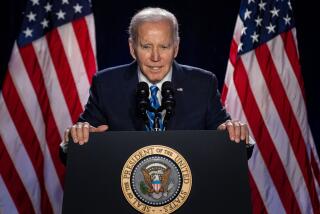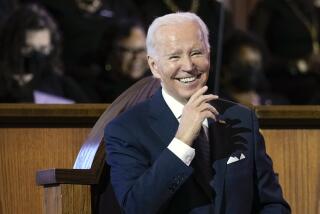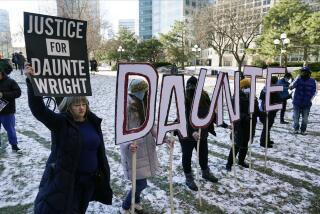Clinton Says U.S. Is Close to Solving Key Social Woes
WASHINGTON — President Clinton told religious leaders Monday that the nation appears to be “on the cusp” of reversing its worst social problems and called on them to help create a “spirit of reconciliation” among Americans to ensure that progress continues.
In a sign that Washington’s perennial combatants may be willing to lay down their arms and work together in this vein, Republican House Speaker Newt Gingrich made similarly strong statements in Georgia about his determination to forge a new coalition to address some of the country’s biggest domestic challenges, such as balancing the federal budget.
But even as Gingrich and the president spoke of bipartisanship, Democrats and Republicans in Congress remained enmeshed in partisan rancor over the future of Gingrich--subject of an ethics investigation--and accusations of White House ethical lapses and fund-raising missteps.
White House officials conceded that the acrid mood on Capitol Hill could derail Clinton’s effort to strike a theme of bipartisan unity.
Clinton made his assertion about improving social trends during a speech to 100 of the nation’s religious leaders at an annual ecumenical prayer breakfast.
“We’re on the cusp here, maybe, of turning a lot of our social problems around,” Clinton said. “We know what we ought to do. Can we do it in the right way, in a spirit of reconciliation?”
The president cited data showing that births to teens have declined little by little over the last four years, the crime rate has gone down steadily over several years and, for the first time in 20 years, the income inequality between wealthy and poor working Americans shrank in 1995.
He conceded that one trend going in the wrong direction is drug use among teens.
The president beseeched the clergy members to join him in spurring on the country to put welfare recipients to work and defuse racial tensions as America becomes more and more diverse through immigration.
Clinton recalled that many religious leaders opposed his decision last year to sign the welfare legislation--presented to him by the GOP-led Congress--that ended the federal guarantee of cash assistance to all eligible poor families. But he called on them to do their part to help welfare recipients move into the working world.
“If every church in America challenged every member of that church who had 25 or more employees to hire another family, the problem would go away,” he said.
The president’s address reflected his evolving strategy for the second term. He hopes to create his legacy by rejecting big-government solutions and instead using his office’s bully pulpit to inspire the public to heighten its own involvement. The new federal role will be as a junior partner--supporting the private and local efforts with some money and advice.
Meanwhile, Gingrich offered an olive branch to the president whom he has spent much of the last two years fighting head-to-head.
“I think we’re at the edge here of potentially a brand new large coalition that is really able to bring people in from all backgrounds,” Gingrich said in Marietta, Ga., before returning to Washington.
But some liberal officials within the administration expressed dismay that the president would put such a positive spin on the state of the country, given that one in five U.S. children lives in poverty, girls younger than 18 are having 200,000 babies per year, and drug use among teens has doubled in three years.
One official, who spoke on the condition of anonymity, said: “I know of no empirical evidence that we are anywhere close to solving our most vexing problems--race and poverty.”
More to Read
Sign up for Essential California
The most important California stories and recommendations in your inbox every morning.
You may occasionally receive promotional content from the Los Angeles Times.










